‘Just three months ago’, writes Tim Montgomerie in today’s Times (£), ‘it was almost fanciful to imagine Boris as a future leader.’ Notwithstanding today’s news, it still is. The idea that, unless David Cameron ‘finds an election game-changer, the party might very reluctantly reach for the blond-coloured nuclear button,’ is a great story. But, even if the rumours that the Mayor is planning to stand for Parliament again are true, securing the leadership of the Conservative Party is going to be very difficult indeed. Here’s why.
Now, I love Boris as much as the next floating voter: it’s not just that there’s something about him; it’s also because he seems prepared, unlike his more constrained counterparts at Westminster, to pick and mix policies which work regardless of whether they’re seen as left- or right-wing, liberal or conservative. Both of these things allow him, despite his privileged upbringing, to connect with ordinary people right across the political spectrum — and that’s something that not many politicians are able to do these days.
But Tory MPs aren’t stupid. They know full-well that Boris was fighting this Mayoral election against an opponent that even many Labour supporters can’t stomach and a Lib Dem re-tread with no chance whatsoever. They also know that taking on and beating a halfway-decent leader of the Labour Party on the national stage (and, just as crucially, across the dispatch box in the House of Commons) is another matter.
Then there are the practical, prosaic obstacles. Unlike the US and many European countries, the UK has no recent tradition of leaders being parachuted into the nomination from outside the legislature. Not only will he first have to win selection for a safe seat in the House of Commons, then wait to get elected to it, he’ll have to wait for the leadership to fall vacant. Then he’ll somehow have to persuade his new colleagues to pick him at the expense of others who have been working their way up the ladder in the more time-honoured manner.
Were David Cameron, then, to fall (or be pushed) under the proverbial bus, there are others in the queue to replace him who are well ahead of Boris, and not that many Tories at Westminster who would appreciate him swanning in and assuming he had their support.
Moreover, the eclectic policy package he’s promoted in London contains a number of inconvenient items that the right — which some still see as his potential power-base — would baulk at. For instance, if you genuinely believe that an even tougher line on immigration and a reassertion of good old family values is the key to Tory election success, then Boris may not be your man. Nor am I entirely sure that he would be more likely to know the price of a pint of milk than the so-called ‘posh boys’ whom a handful of vocal backbenchers already seem to have such a problem with.
It’s also worth remembering that, in a country that seems to have decided (albeit for no good reason) that leaders should be in their late-thirties or early-forties when they first take over, Boris, who’ll be 48 in June this year, is no spring chicken. In a few years’ time, his feathers will be even thinner.
In essence, then, it’s undoubtedly true that the Mayoralty has helped Boris show that he can, in fact, deal seriously with some heavyweight issues and, just as importantly, that he isn’t the divisive buffoon that some assumed he was before he got the job. But on the downside it’s meant precious time out of the Commons, and in any race for the national leadership that’s what really counts. So Boris as leader? Fun, certainly, but almost certainly fantasy politics.
Tim Bale is Professor of Politics at Sussex University







Comments